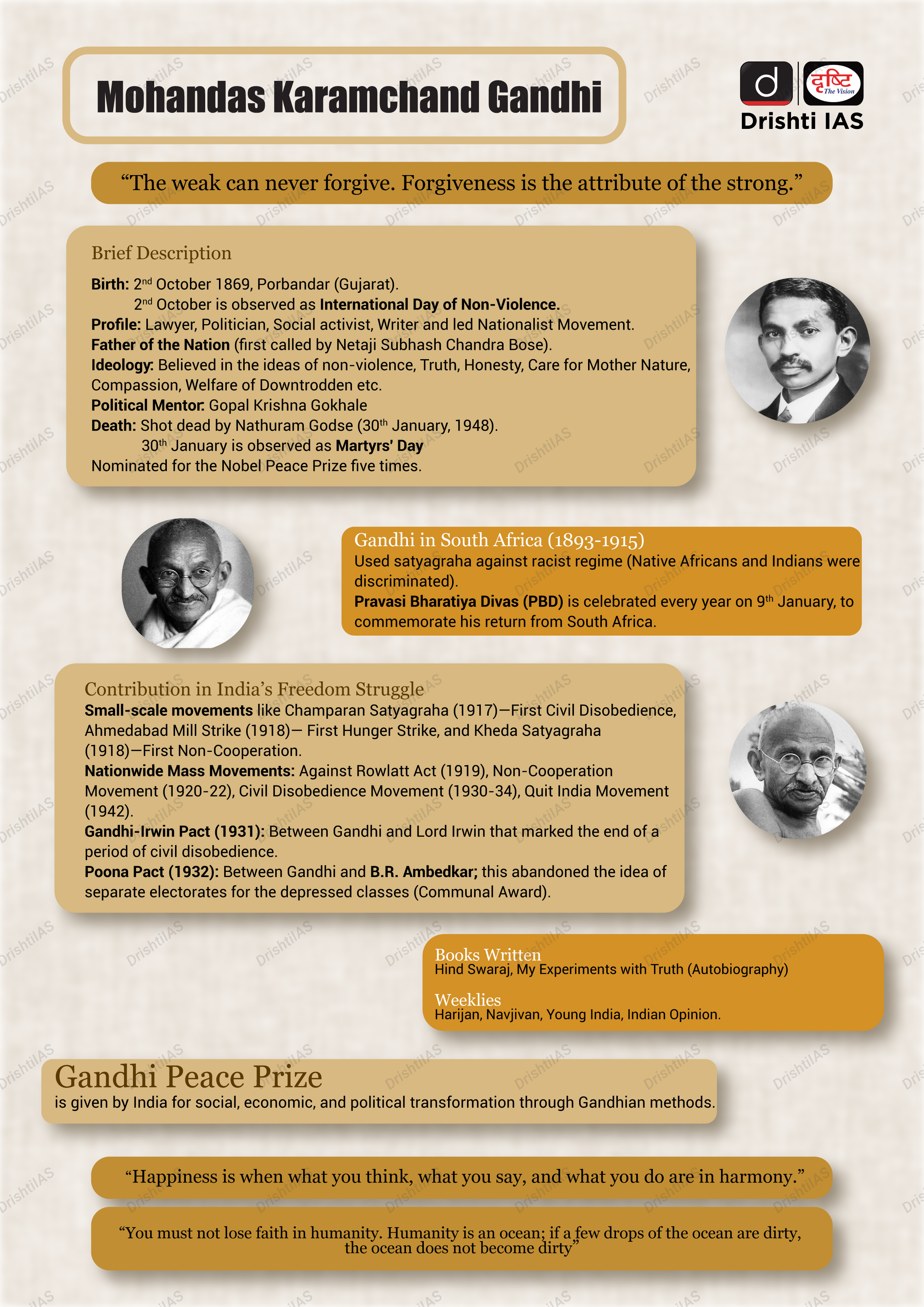Ethics
Ideals of Mahatma Gandhi
- 31 Jan 2023
- 6 min read
For Prelims: Mahatma Gandhi, Martyrs’ Day, Untouchability, Martin Luther King in the United States, Aung San Suu Kyi in Myanmar, Communal Harmony.
For Mains: Major Gandhian Ideologies, Relevance of Gandhiji in Today’s Context.
Why in News?
The Nation pays tribute to Mahatma Gandhi on his 75th death anniversary on 30th January 2023. The day is also observed as Martyrs' Day.
What are the Major Gandhian Ideologies?
- Vision for India: Gandhi's vision for India went beyond political independence from colonial rule.
- He aimed for social emancipation, economic empowerment, and a shared sense of solidarity across different language, religion, and cultural backgrounds.
- Non-violence: Gandhi was a strong advocate of non-violence and believed that it was the most powerful weapon in the struggle for justice and freedom.
- He also believed that non-violence should be a way of life, not just a political strategy, and that it would lead to lasting peace and social harmony.
- Gandhi was a leader who inspired and empowered the people through love and compassion.
- Against Discrimination: Gandhi travelled all over India and saw the different cultural parts of the country. He brought people together by highlighting the common things that united them, like their faith.
- Gandhi strongly believed in treating everyone equally, regardless of religion or caste. He was against discrimination and the practice of untouchability.
- Secular Outlook: Gandhi was a Hindu but believed in a secular India, where all religions could exist peacefully together. He was very upset about the partition of India, which was based on religion.
- Today, it is important to remember Gandhi's values of peace, inclusiveness, and harmony as these values are still relevant.
- Communal Harmony: Gandhi was a firm believer in the unity of all communities and worked tirelessly to promote communal harmony.
- He believed that India's strength lay in its diversity and that this diversity should be celebrated, not feared.
- He was deeply troubled by the Hindu-Muslim divide and worked to bring the two communities together.
- Self-Reliance: Gandhi believed in the importance of self-reliance and encouraged Indians to become self-sufficient in as many ways as possible.
- He encouraged the use of local resources and traditional skills and the development of cottage industries.
- He also believed that the people of India should take responsibility for their own development and not rely on external support.
What is the Relevance of Gandhiji in Today’s Context?
- The ideals of truth and nonviolence, which underpin the whole philosophy, are relevant to all humankind, and are considered as universal by the Gandhians.
- More than ever before, Mahatma Gandhi's teachings are valid today, when people are trying to find solutions to the rampant greed, widespread violence, and runaway consumptive style of living.
- The Gandhian technique of mobilising people has been successfully employed by many oppressed societies around the world under the leadership of people like Martin Luther King in the United States, Nelson Mandela in South Africa, and Aung San Suu Kyi in Myanmar, which is an eloquent testimony to the continuing relevance of Mahatma Gandhi.
- The Dalai Lama said, "We have a big war going on today between world peace and world war, between the force of mind and the force of materialism, between democracy and totalitarianism." It is precisely to fight these big wars that the Gandhian philosophy needed in contemporary times.
UPSC Civil Services Examination, Previous Year Question (PYQ)
Prelims
Q1. Who among the following is associated with ‘Songs from Prison’, a translation of ancient Indian religious lyrics in English? (2021)
(a) Bal Gangadhar Tilak
(b) Jawaharlal Nehru
(c) Mohandas Karamchand Gandhi
(d) Sarojini Naidu
Ans: (c)
Q2. With reference to the British colonial rule in India, consider the following statements: (2019)
- Mahatma Gandhi was instrumental in the abolition of the system of ‘indentured labour’.
- In Lord Chelmsford’s ‘War Conference’, Mahatma Gandhi did not support the resolution on recruiting Indians for World War.
- Consequent upon the breaking of Salt Law by Indian people, the Indian National Congress was declared illegal by the colonial rulers.
Which of the statements given above are correct?
(a) 1 and 2 only
(b) 1 and 3 only
(c) 2 and 3 only
(d) 1, 2 and 3
Ans: (b)
Mains
Q. Bring out the constructive programmes of Mahatma Gandhi during Non-Cooperation Movement and Civil Disobedience Movement. (2021)





